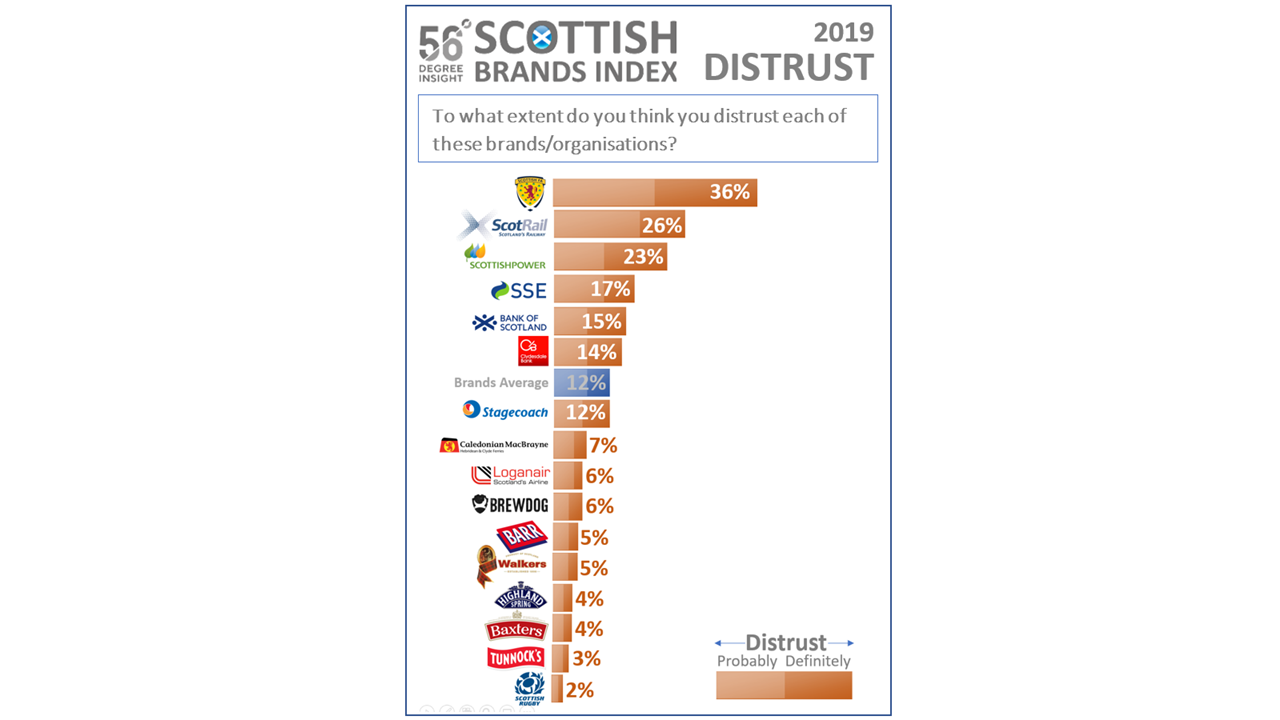12th August 2019:
How much Trust is there in our iconic Scottish brands?
The 56 Degree Insight team are excited to share the results from our survey of 16 iconic Scottish brands - the 2019 56DI Scottish Brands Index survey. This will be an annual survey which adds a Scottish flavour to brand evaluation – a unique addition to the Scottish marketplace. Each week we will take a look at one of the key metrics of brand success. This week we begin with Trust, something that a certain Steve Jobs rated rather highly:
A short but very powerful assertion from the creator of the world’s biggest brand! It reflects the fact that Trust is at the centre of every healthy relationship – personal and business. There is plenty of evidence to show that the most successful companies are those who have a healthy, trusting relationship with their target audience. Economies work because people trust each other and the businesses they support.
We would argue that the main purpose of marketing and communications should be to earn and nurture trust – and every customer interaction provides an opportunity to build a relationship and gain the trust of that customer. That earned Trust then drives the reputation of the brand – and ultimately the growth or success of the business. In terms of quantifying the value of Trust to Reputation, most commentators agree that Trust tends to account for anywhere between 60% and 80% of a brand’s reputation, thus going a long way to ratifying Jobs’ assertion.
And, of course, Trust then drives the choice of brands and products. Ultimately, consumers put their money where their trust is. Though of course, consumers do give money to companies they don’t necessarily trust - mobile phone providers, local utilities, etc. - this is usually because they perceive that they lack choices. When they have choices, they will spend more money with businesses they can trust. Going back to Steve Jobs, why do so many consumers pay above average prices to purchase Apple devices? Because generally, they trust Apple more than any of its competitors, to produce quality devices.
So, Trust is an important element of any evaluation of a brand – quite possibly the most important element (though obviously its scale of importance varies by sector and industry). Thus, when developing the 56 Degree Insight Scottish Brands Survey, although we didn’t want to take Steve Jobs so literally to assume that a single question on Trust would be sufficient, we knew that such a question was a vital ingredient.
The survey was undertaken during June and July 2019 using Kantar’s Scottish Opinion Survey – the only in-home, face-to-face omnibus survey in Scotland, and one that is representative of the Scottish adult population in terms of geography and demographics. Some 2,000 people were interviewed and asked a range of questions about a cross-section of Scottish consumer-facing brands – 16 in total. To make survey length manageable, for each brand, around 500 respondents provided their opinions.
As well as being asked the extent to which they felt they could trust each brand, respondents were also asked about brand awarenesss, performance, likelihood to recommend, how innovative they were, their potential for future success and the extent to which they portrayed Scotland in a positive light.
Following our focus on Trust this week, we’ll examine responses to the other metrics over the coming weeks and then finally provide our combined score to reveal the leading Scottish brand among the 16 we tested.
Brands were selected carefully; all were consumer-facing, some longer established than others and coverage spanned a range of sectors – transport, food and drink, utilities, financial services and sport. The 16 brands were key players within these sectors but obviously we were unable to cover all brands – however our selected brands represent a good cross-section of different types of brands in the Scottish marketplace.
So, which of our 16 brands performs best in terms of the trust of the Scottish population? Well, the most trusted of our Scottish brands is Tunnocks – 82% feel they can trust the brand, and the biggest proportion (51%) definitely believe they can trust this maker of the Tea Cake and the Caramel Wafer biscuit. But other food and drink brands are not far behind – shortbread manufacturer Walkers, Speyside-based Baxter’s and Barr’s, the company behind the iconic Irn Bru all score trust ratings of over 75%. And Scotland’s longest established bottled water producer, Highland Spring is trusted by 72% of Scots. Clearly, out of the brands selected, the food and drinks brands are deemed easier to trust than brands in other sectors.
On average across the 16 brands as a whole, 57% of Scots trusted them. The only other two brands to poll above this were the Scottish Rugby Union (65%) and Caledonian MacBrayne – although a larger proportion felt the ferry operator probably could be trusted rather than definitely so.
At the other end of the league table sits the Scottish Football Association. Only a quarter of Scots trust football’s primary administrative body, and indeed, most of those were fairly luke-warm in their belief, saying it was only probably the case. The Clydesdale Bank also suffers from lower levels of Trust among Scots – under 4 in ten claimed to trust them (37%),
The two energy companies reviewed – Scottish Power and SSE both demonstrated similarly low trust ratings in the low-mid forties. Scotrail also polled significantly below average at 47%, perhaps reflecting recent problems caused by train cancellations and delays across several parts of its network.
Regional airline Loganair also demonstrates low levels of trust with only 43% claiming they trust the airline. However this masks the fact that Loganair received the highest level of ‘don’t know’ responses on the subject of trust – over half were simply unsure. So, for Loganair it’s less about lack of trust and more about lack of experience to enable them to have a clear opinion.
Brewdog offers a similar scenario. The craft beer brand has risen quickly to become an important Scottish brand in recent years, but although a below average 54% trust the brand, 40% simply were unsure.
As can be seen, when we look within the different sectors, some interesting patterns emerge. Firstly, as we have seen, the established food and drink brands more naturally engender positive levels of trust among consumers than other sectors. The two financial services brands reviewed perform more poorly on this metric – especially the Clydesdale Bank, though Bank of Scotland has trust levels not far from the average. The energy companies have similar levels of performance, significantly below the average in terms of Trust, while there is more diversity in the four transport brands evaluated reflecting different levels of experience and knowledge, as well as performance. Especially interesting are the very diverse views on levels of trust in the administrative organisations running two of our major sports: the Scottish Rugby Union demonstrate that it is possible to have high levels of trust among the public as a governing body – something which, for now, the poorly performing Scottish FA can only aspire to achieve.
It is also worth looking at the levels of distrust across the range of brands (see graphic overleaf). On average, 12% of Scottish consumers show levels of distrust in the brands – but this masks a huge diversity of opinion. The Scottish FA tops the leaderboard in terms of distrust – over a third of Scots actively distrust the Scottish FA – 18% say they probably don’t trust the organisation and a similar percentage definitely don’t trust them. By some distance, in terms of trust, the Scottish FA is behind all of the other brands under review. Again, the contrast with the Scottish Rugby Union is stark – only 2% distrust rugby’s governing body.
And Scotrail, more than any other transport provider in our study, has clear trust issues – over a quarter of Scots do not trust the national rail operator (26%) – again probably reflecting many of the recent well-publicised operational issues.
Reflecting a lot of the research we have undertaken before in the energy sector, SSE and especially Scottish Power, have very clear issues of trust among consumers. Almost a quarter of Scots distrust Scottish Power (23%), and 17% feel this way about SSE. And not surprisingly, the two banks in our study also had significant levels of distrust at 15% (Bank of Scotland) and 14% (Clydesdale Bank).
The picture remains much more positive when we look at the food and drinks sector with levels of distrust in single figures for all 6 brands.
Of course, looking at each brand’s rating in terms of Trust does bring out variations by different types of respondent – males vs females, younger vs older etc. But at the overall level, ratings of Trust are remarkably stable and fairly consistent across different demographic groups. If anything, the under 25s tend to be rather more trusting of brands than older consumers (less baggage, and fewer bad experiences perhaps?) and there is some evidence that males tend to distrust brands rather more than their female counterparts – though this is perhaps as much a reflection of the chosen brands as anything else.
So, what does this analysis tell us about levels of Trust in Scotland’s brands? Clearly there are marked variations by brand suggesting that there are lessons to be learned and examples of good practice that could work across sectors. Is there anything that the likes of Scottish Power and SSE could learn about Trust from the food and drink brands? The sectors are so different, especially in terms of how much consumers are engaged or interested and it is undoubtedly easier to engender trust in products than in service sectors where ‘more can go wrong’ when you interact with a brand. However, it is reasonable for consumers to demand good service and memorable experiences irrespective of the sector or industry. And within sports administration, the huge diversity in trust between the SRU and the SFA suggests that there must be many lessons that football’s governing body could learn from its rugby union counterpart to increase the levels of trust of fans.
Going back to Steve Jobs and his statement that a Brand is simply Trust. This may be rather simplistic, but there is no argument or doubt that Trust plays an extremely important role in a brand’s reputation and how it is perceived. There is no question that brands which have high proportions of trusting customers can charge a premium, are more successful and are more likely to grow than those where Trust is less prevalent.
Next week we will take a look at another key element of brand success – the extent to which they are innovative. In an ever changing world, being seen to be ahead of the curve in terms of technological trends and moving with the times is crucial. Which of our Scottish brands ae perceived to be most ready for the future?








